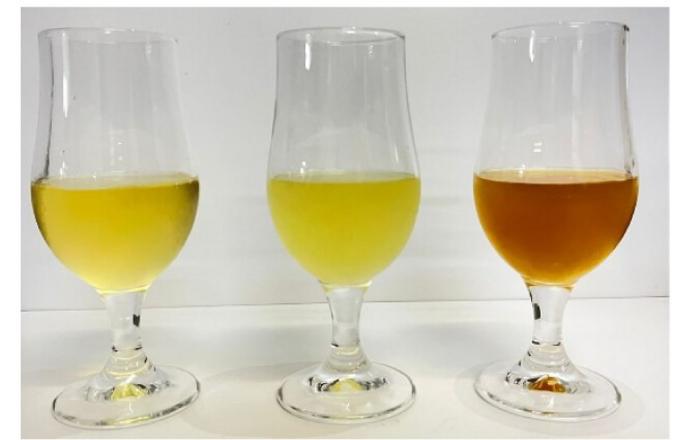Researchers have discovered that fermenting apple juice with a kombucha culture produces a drink rich in flavonoids and well-liked by taste testers, potentially rivaling traditional tea-based kombucha.
Summary: A new study explores kombucha-like beverages made from fruit juices, finding that fermented apple juice offers high levels of beneficial compounds and a pleasant taste profile.
Estimated reading time: 4 minutes
Kombucha, the fizzy fermented tea drink known for its tangy flavor and potential health benefits, may have a new rival. Researchers have found that fermenting apple juice using the same process creates a beverage with higher levels of certain beneficial compounds and a taste that rivals traditional kombucha.
The study, published in ACS Agricultural Science & Technology, compared the biochemistry and flavor profiles of traditional tea-based kombucha with fermented apple and passion fruit juices. The results suggest that apple juice could be a promising alternative base for kombucha-like beverages.
The Science of Fruit-Based Kombucha
To create these novel drinks, researchers fermented apple juice, passion fruit juice, and tea separately using a SCOBY (symbiotic culture of bacteria and yeast) – the same microbial culture used to make traditional kombucha. After a 10-day fermentation period at room temperature, the team analyzed the beverages for several bioactive compounds:
- The apple-based drink contained the highest levels of flavonoids, outperforming both traditional kombucha and the passion fruit beverage.
- Traditional kombucha and the apple drink had comparable levels of phenolic compounds, both higher than the passion fruit version.
- All three beverages contained similar amounts of anthocyanins, red-colored antioxidants.
These findings are significant because flavonoids, phenolic compounds, and anthocyanins are known for their potential antioxidant and anti-inflammatory properties.
Taste Test Results
The study also included a sensory evaluation involving 12 volunteer taste testers. They assessed each beverage’s color, aroma, and flavor. Key observations included:
- Color differences: The apple drink appeared amber, the passion fruit yellow, and the traditional kombucha gold.
- Aroma: Both fruit-based drinks had stronger, fruitier aromas compared to the tea-based kombucha.
- Flavor: The apple and tea-based drinks were described as sweeter, while the passion fruit version was noted as more bitter.
Interestingly, the apple-based drink and traditional kombucha received equal votes as the favorite beverage among testers.
Implications and Future Research
The study’s results suggest that fermented apple juice could be a successful alternative to tea-based kombucha. Its higher flavonoid content, combined with a pleasant taste, makes it a promising candidate for further development.
Socorro Vanesca Frota Gaban and colleagues, who conducted this research, plan to explore the health benefits and flavors of other fermented fruits in future studies. This opens up new possibilities for creating a diverse range of probiotic beverages with unique nutritional profiles and taste experiences.
Addressing Potential Concerns
While these findings are exciting, some questions remain:
- How do the probiotic benefits of fruit-based fermented drinks compare to traditional kombucha?
- Are there any potential allergen concerns when using fruit juices as a base?
- How might the sugar content of fruit juices affect the fermentation process and final nutritional profile?
Further research will be needed to address these questions and fully understand the potential of fruit-based kombucha alternatives.
Quiz
- Which fruit-based drink contained the highest level of flavonoids?
- How many volunteer taste testers participated in the sensory evaluation?
- What was the fermentation period for the beverages in this study?
Answers:
- The apple-based drink
- 12 taste testers
- 10 days
Further Reading
Glossary of Terms
- Kombucha: A fermented, slightly alcoholic tea drink.
- SCOBY: Symbiotic Culture of Bacteria and Yeast, used to ferment kombucha.
- Flavonoids: A class of plant and fungus secondary metabolites with potential health benefits.
- Phenolic compounds: Organic compounds found in plants with potential antioxidant properties.
- Anthocyanins: Water-soluble pigments that may appear red, purple, or blue depending on pH.
- Bioactive compounds: Chemicals found in small amounts in plants and certain foods that may promote good health.
Tweet: “Apple juice kombucha? New study shows it beats traditional tea-based brew in flavonoid content and taste tests. Could this fruit-based ferment be the next big thing in functional beverages? #Kombucha #NutritionScience”
Enjoy this story? Get our newsletter! https://scienceblog.substack.com
If our reporting has informed or inspired you, please consider making a donation. Every contribution, no matter the size, empowers us to continue delivering accurate, engaging, and trustworthy science and medical news. Independent journalism requires time, effort, and resources—your support ensures we can keep uncovering the stories that matter most to you.
Join us in making knowledge accessible and impactful. Thank you for standing with us!

